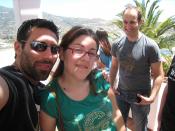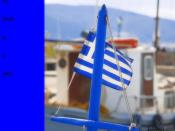Herodotus, Aeschylus and Plutarch are all directed by the views of the society of their time. While the three classical writers have similarities, they came from different periods in history. They have gathered evidence or information from varying sources, focused on different aspects, and used different text types to tell the tale. These factors have influenced their thinking, and accounts for their differences in perception and interpretation of the Battle of Salamis.
All writers are affected by who they are, where they are from and their topic of interest. Herodotus was no exception. Herodotus based his work on solid research and travelled widely, interviewed hundreds of people and tried to have two or three versions of events - e.g. "Such is the Athenian account of how the battle started" (The Histories, Herodotus, 8, 85-92) - both the Persian version and the Greek. He was not perfect, however: there were mistakes, and he was affected by his context.
Herodotus was of Greek origin, writing around 50 years after the Battle of Salamis in 480 BC, so he was not an eyewitness, although some of his information may have come from primary sources. Herodotus gave a detailed account of the Battle, and describes little incidents that contributed to the final triumph. However, although he mentions strengths in both armies, one cannot miss the pro-Athenian bias, e.g. "These two officers (Persians), as I say, had some success; but the greater part of the Persian fleet suffered severely in the battle..."
Like other Greeks of his time, he believed that arrogance would result in punishment from the gods, and he used this to explain the Greek victory. While he did not give all the credit to the gods, he did not completely remove their influence - rather, individual's actions and not the gods,


